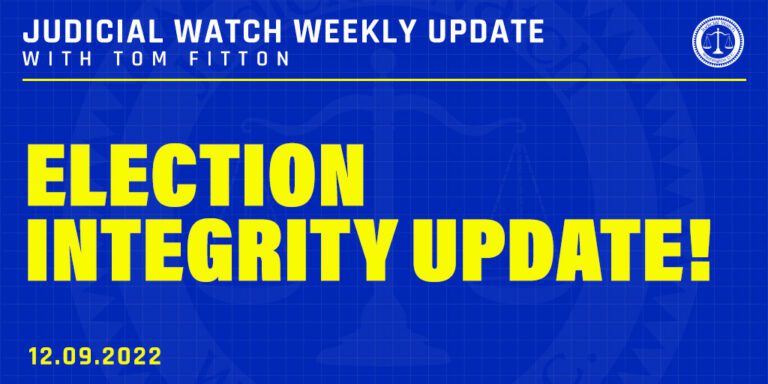

Election Integrity Update!


Judicial Watch Monitors Georgia Election Polls During Run-Off
Court Hearing in Lawsuit Challenging Illinois Counting Ballots Received up to Two Weeks after Election Day
Judicial Watch Monitors Georgia Election Polls During Run-Off
As part of our ongoing election integrity efforts, we had volunteer observers on the ground, monitoring polling sites in Georgia this week during the post-Election Day run-off.
Our legal team monitored Fulton, Dekalb, Cobb, Gwinnett, Cherokee, Forsyth, and other counties. We do this to ensure compliance with state and federal laws. Our observers have monitored many state and national elections and have been certified and served as international election observers.
Our lead election law attorney Robert Popper established the organization’s election monitoring program. Popper is a former deputy chief of the Voting Section, in the Civil Rights Division of the Department of Justice and a veteran poll observer for the Department of Justice.
Georgia has improved its election system in recent years but, as we saw in Maricopa County, Arizona, many problems can pop up.
We will keep you apprised of developments in Georgia, as well as in our many ongoing election integrity efforts across the country.
Court Hearing in Lawsuit Challenging Illinois Counting Ballots Received up to Two Weeks after Election Day
U.S. District Court Judge John F. Kness conducted a court hearing this week in the case we filed on behalf of Congressman Mike Bost and two other registered Illinois voters to prevent state election officials from extending Election Day for 14 days beyond the date established by federal law (Rep. Michael J. Bost, Laura Pollastrini, and Susan Sweeney v. The Illinois State Board of Elections and Bernadette Matthews (No. 1:22-cv-02754)).
We filed the lawsuit on May 25, 2022. Christine Svenson, Esq., of Svenson Law Offices in Palatine, Illinois, is assisting us with the lawsuit.
On November 11, 2022, Judge Kness rejected a motion by the Democratic Party of Illinois to intervene as a defendant in our lawsuit challenging the Illinois election law permitting mail-in ballots to be received as long as two weeks after Election Day.
Federal law defines Election Day as “the first Tuesday after the first Monday in November of every even-numbered year.” The initial complaint states: “Despite Congress’ clear statement regarding a single national Election Day, Illinois has expanded Election Day by extending by 14 days the date for receipt and counting of vote-by-mail ballots.”
We point out that the current Illinois election law allows vote-by-mail ballots received up to 14 days “after the polls close on Election Day” to be counted as if they were cast and received on or before Election Day. Illinois law also provides that “[e]ven vote-by-mail ballots without postmarks shall be counted if received up to 14 calendar days after Election Day if the ballots are dated on or before Election Day.”
Until next week …















